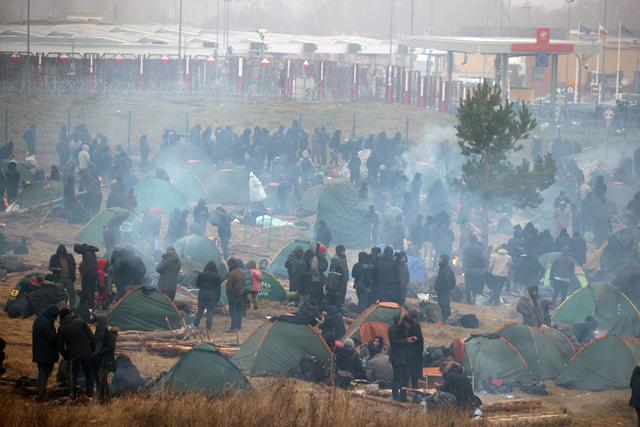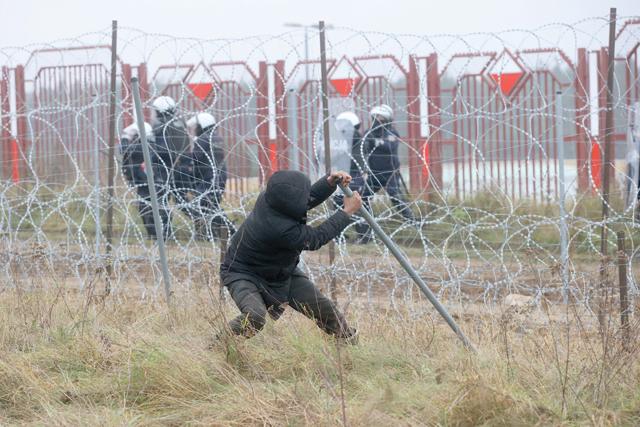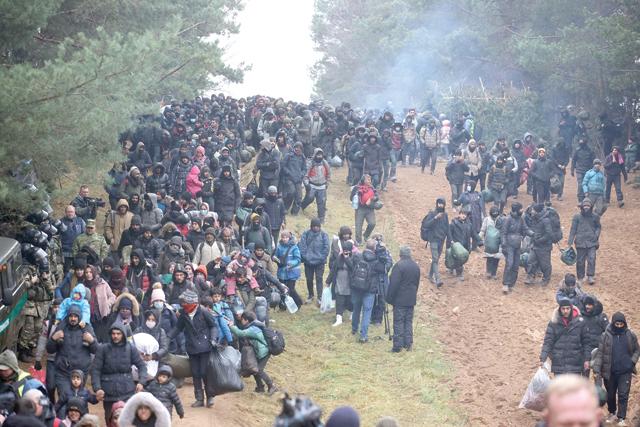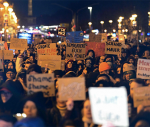You are here
Poland warns migrant crisis could last for years
By AFP - Nov 18,2021 - Last updated at Nov 18,2021

Migrants aiming to cross into Poland are seen in a camp near the Bruzgi-Kuznica border crossing on the Belarusian-Polish border on Wednesday (AFP photo)
SOKOLKA, Poland — Poland warned on Wednesday that the crisis on the Belarusian border could last for months or even years, a day after Polish forces used tear gas and water cannon to deter stone-throwing migrants.
Polish Defence Minister Mariusz Blaszczak said there had been further attempts at crossing the border during the night, in the latest escalation of a months-long standoff on the EU's eastern border.
Thousands of migrants, mainly from the Middle East, are staying on the border in what the West says is a crisis engineered by Belarus to try to divide the EU and hit back against sanctions.
Belarusian President Alexander Lukashenko and his main ally, Russian President Vladimir Putin, have rejected the accusations and criticised the EU for not taking in the migrants.
"We have to prepare for the fact that the situation on the Polish-Belarusian border will not be resolved quickly. We have to prepare for months or even years," Blaszczak told Poland's Radio Jedynka.
Blaszczak said attempts to cross the border had continued during the night, adding that migrants had used the same "method of attacking the Polish border" as seen on Tuesday at the Bruzgi-Kuznica border crossing.
"The public attention focused on what happened in Kuznica, while smaller groups of migrants tried to break through the Polish border in other sections, also at night," he said.
Flying bans
The border guard service said it had detected 161 illegal crossing attempts on Tuesday, including "two forceful attempts".
Polish police said nine officers, a border guard and a soldier were hurt during Tuesday's clashes — though no officers were still in hospital on Wednesday.
Belarus and Russia condemned the use of tear gas and water cannon, which came a day after the EU and US said they were expanding sanctions against Belarus.
The West has accused Belarus of luring thousands of migrants, many from Iraq and Syria, with the promise of an easy crossing into the EU and then forcing them to stay at the border.
Eastern EU members Latvia, Lithuania and Poland have all refused to take the migrants, leaving many stranded for weeks in forested borderlands.
Following pressure from the EU, several airlines have said they will now stop transporting would-be migrants to Belarus.
Iraq has also said it will start voluntary repatriations of its citizens from Belarus this week and the EU border agency Frontex is working with the Polish and Iraqi authorities on arranging charter flights from Poland as well.
‘Extremely dangerous’
Lukashenko, who has crushed opposition to his rule over nearly three decades in power, discussed the crisis with German Chancellor Angela Merkel on Monday.
It was his first phone call with a Western leader since he suppressed mass protests against his rule last year.
Kremlin spokesman Dmitry Peskov on Wednesday welcomed the talks saying it was “very important that contact has been made between representatives of the EU and the leadership of Belarus”.
But Polish government spokesman Piotr Muller the conversation was “not a good step” and appeared to be “an acceptance of his choice”, referring to Lukashenko.
Aid groups say at least 11 migrants have died on both sides of the border since the crisis began in the summer and have called for a humanitarian response to the crisis.
Visiting areas near the border on the Polish side, the Council of Europe human rights commissioner Dunja Mijatovic on Tuesday said the situation was “extremely dangerous”.
“We need to find a way to de-escalate, to make sure the focus is really to stop the suffering,” she told reporters.
The Belarus Red Cross on Wednesday said that some 1,000 migrants were being put up in a “logistical centre” close to the Bruzgi-Kuznica checkpoint.
Another 800 were still in a makeshift camp near the border, Russian news agency Ria Novosti reported.
Volunteers and military personnel distributed hot porridge, sweets, water, tea and canned food in what looked like a large warehouse, according to images shown on Russian state television.
The Belarusian health ministry said it had hospitalised six people, including four children, from the Bruzgi camp.
Related Articles
SOKOLKA, Poland — Polish forces fired tear gas and deployed water cannons against stone-throwing migrants trying to cross the Belarusian bor
WARSAW — Poland said it blocked a bid by hundreds of migrants to illegally enter the country from Belarus on Monday, warning of an "armed" e
MOSCOW — Belarus is working to repatriate migrants massed on its border with Poland, President Alexander Lukashenko said on Monday, apparent



















